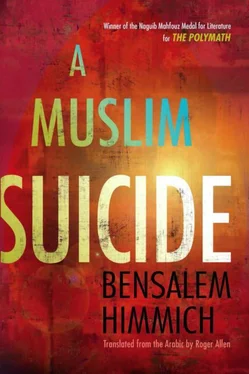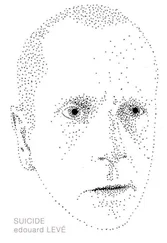When I got back to the house just before noon, I found Fayha' clearly distressed. She told me that Hafsa's health was very bad and went on to suggest that the real cause had nothing to do with her aunt's death. I comforted her by saying that things would soon return to normal. She told me that she had hired two middle-aged women to help run the house, and I told her to go and take care of her guests.
I remained in my closet, wondering how I could solve this problem of Hafsa so that the situation would improve. My hope was that she would get over her distress and return to a state of normalcy. I looked in my bed and various parts of the room for scorpions or poisonous insects, but was relieved not to find any traces of them. I now performed some menial tasks before praying and then eating lunch. Following that, I took a nap in the hope of recovering some of my peace of mind and clearing my brain, but to no avail.
Only a few moments passed before once again I heard the woman moaning and crying, loud enough that it sounded like screams. I made my way stealthily to her room and closed the door behind me. The combination of closed space and sunshine made the atmosphere damp and fetid. The woman paid no attention to the fact that I had come in; she may not even have noticed. Her lanky body was laid out on the bed, and she looked very frail and emaciated. Her face was pallid and sickly, and her eyes were glazed as they stared vacantly at the ceiling. She kept sighing, but even so she seemed in a permanent stupor. I sat down on the bed beside her and touched her left hand with a view to feeling her pulse. With that she opened her eyes with a start, and let out a piercing screech. I seized the opportunity to beseech her to take some pity on herself and give herself back to God with a humble and willing heart. For my part I promised that I would apply all my knowledge of medicine and law to restore her to health and common sense. Instead she turned toward me and fixed me with a vicious stare.
"You claim to be able to cure me," she said, "when you are the cause of my disease?"
I asked her to explain.
"You've been digging my grave ever since you arrived at this house," she told me. "You've completely ruined my relationship with my mistress, and you've turned `Abla away from me. As you have come to realize, `Abla is my entire life and spirit. Here you are, wanting to make me better, when you're the one who's brought this calamity on me!"
The words of a desperate, perverted woman. So how was I supposed to deal with her? What legal or logical yardsticks was I to apply in this case?
"Listen, woman!" I told her, "you're not being serious. Only God alone can determine what is to be your lot. However you had absolutely no right to exert compulsion and pressure on a young, unmarried girl like `Abla. Your behavior has no justification in either law or logic!"
With that she stood up, albeit with some difficulty.
"So," she railed at me, "you want me to justify my behavior, is that it?"
"Yes, I do."
"The only way for me to be cured is for `Abla to come back. Will you bring her back?"
"Listen, woman," I said, "Abla is married to a young man whom she loves and who loves her."
"That's utter nonsense! You're the one who made her think marriage was wonderful, and then married her off. You want to make me better? Fine, then release her from her marriage to your companion and bring her back to me."
"Hafsa, that is utterly out of the question."
"May God have mercy and offer His forgiveness. You insist on doing me ill. Get out of my sight, you agent of the devil in person. Get out, or else I'll kill you and myself as well."
There was nothing more I could do to calm her down, particularly since she started hurling all the furniture and appliances she could lay her hands on at me, wailing and shouting for help as she did so. I rushed to the door and opened it, only to discover Bilal and two servants facing me, with my wife standing right behind them with a worried look on her face. Hamada was standing by her side, shivering and weeping.
"Shut this woman up," I told them all, "but don't hit her."
With that I left the house and wandered around the alleys and squares of the city. Sometimes I paused to consider what on earth I had allowed myself to get involved with, and at others I simply stared at the groups of houses, walls, and human bodies, whether stationary or passing by, each one of which undoubtedly harbored secrets and riddles whose sheer numbers were known to God alone.
I meandered mindlessly along the shore, and only came to myself again when I approached the city itself and noticed how unusually blustery and miserable the spring season was: strong winds; dark, cloudy sky; turbulent, grayish waves, all of them enough to make you feel depressed and resentful. But even though nature itself may have been showing itself in entirely new garb, I had to admit to myself that my soul was feeling crushed by a nasty mix of humors. What made things even worse was that I was probably incapable of finding an effective way of rooting them out and repairing the damage they were doing.
In the dead of night I headed for the mosque, performed my ablutions, then prayed the sunset and evening prayers by myself in a darkened corner of the building; I then proceeded to perform supplementary prayers, one after the other, and muttered some verses from the Qur'an. In so doing, I was concentrating my entire attention on God the Eternal, the One, the only One, who knows all secrets and what is beyond our knowing, in whose hands is all authority and to whom we shall return. When I turned around, I noticed that three of my closest confidants were standing to my right, waiting for me to finish. I invited them to join me, and they did so, offering their greetings. I guessed that they had something to tell me, so I asked them what it was. Al-Sadiq told me that they would have to leave to return to Granada early the next day, offering as a pretext the fact that they had to attend to their families and children. I asked them what they had been doing the day before and today, and they told me about the goods and books they had purchased and the young people of Sabta whom they had met.
`Abd al went on to tell me something that the others seemed reluctant to mention: in the main mosque they had attended a lesson taught by the jurist Idris al-Tadili, and had come to realize that the man knew absolutely nothing and had no particular method to his teaching. He merely prattled away about things he knew nothing about, made slanderous comments about learned scholars-accusing them of heterodoxy and apostasy. In so doing, he was setting himself as the great defender of the precious egg of religion, when he was not even equipped to look after a chicken's egg. They told me that, when they had addressed questions to him, whether on matters of tradition or interpretation, he had been unable to respond, except to rant and rail. He had then called them various rude names and had crowned his angry retort by calling them members of the "Sab`inid" party, something which, as he himself put it, was the very acme of heresy and disbelief. Here was this man, he said, residing in the Sunni Maliki city of Sabta, corrupting its innocent youth and denouncing its most prominent jurists and religious figures, not to mention its governing authorities. They finished by telling me that he had then said some particularly foul things that they preferred not to repeat.
I asked God for forgiveness and sought His protection against the wrongs perpetrated by charlatans and the lies of the envious and vengeful, He being the one responsible for them and the arbiter between myself and them in this ephemeral world and the next. I thought this was a good time to let them know that Ibn Khalas had expressed a desire to meet me.
Читать дальше












